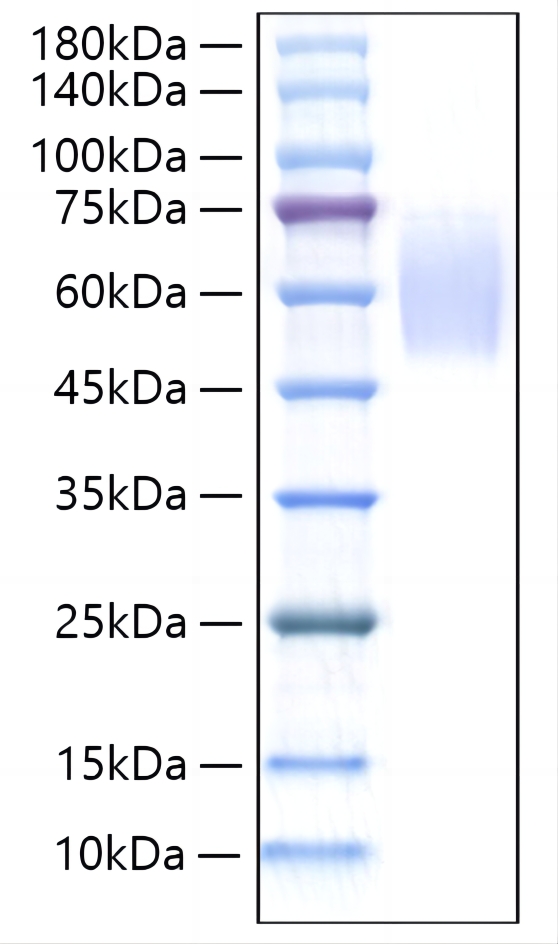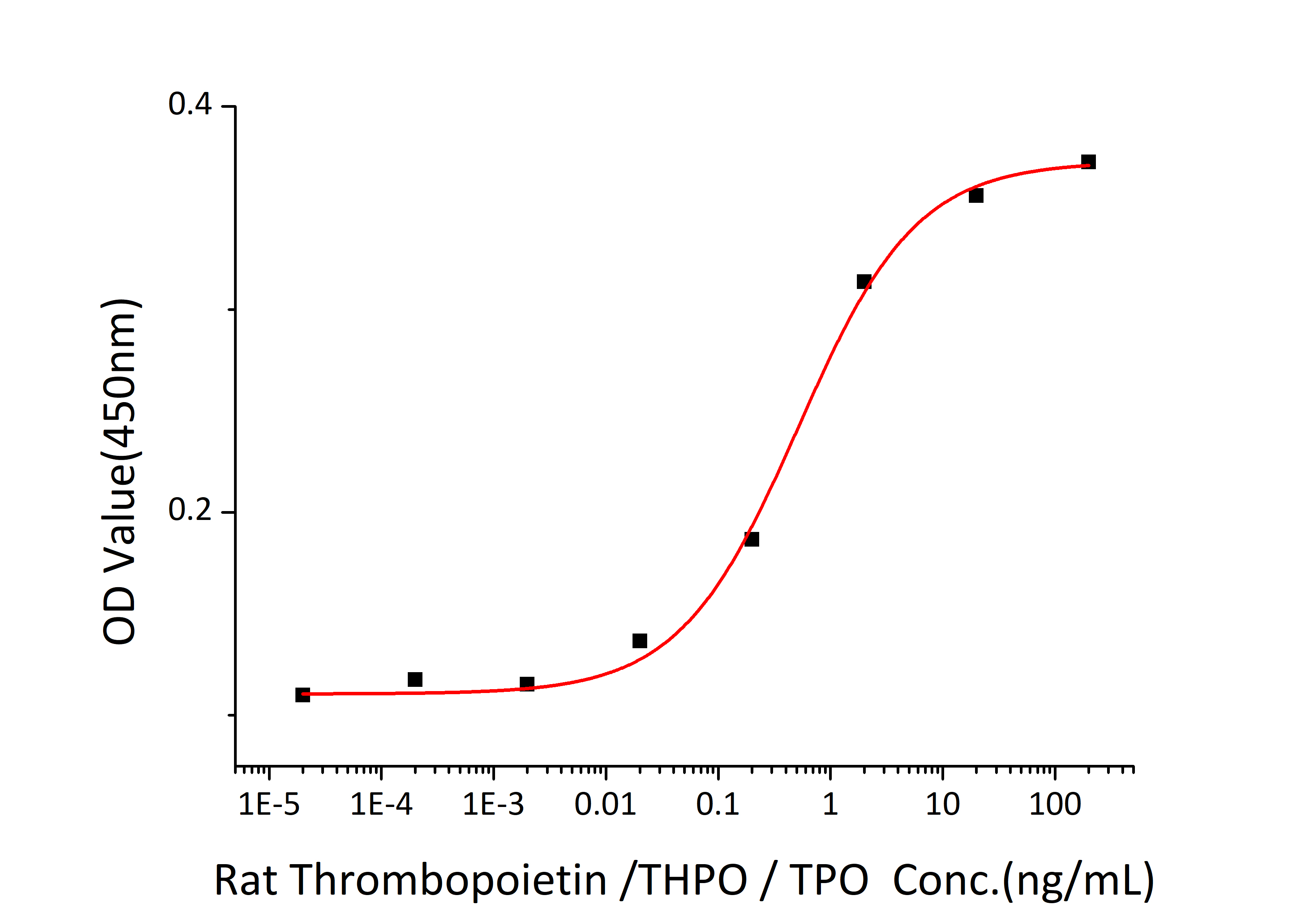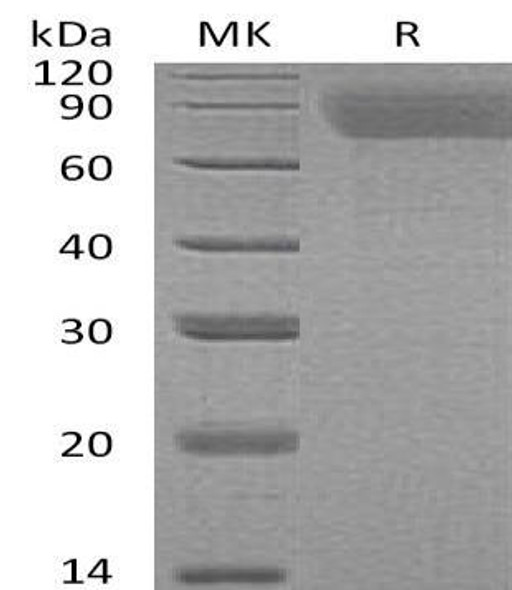Description
Recombinant Rat Thrombopoietin /THPO / TPO Protein
The Recombinant Rat Thrombopoietin /THPO / TPO Protein is a high-quality recombinant protein produced for advanced research applications in molecular biology and biotechnology. This protein serves as a critical reagent in various experimental contexts, including functional studies, binding assays, and therapeutic development programs, providing researchers with a standardized and reliable tool for investigating protein function and interactions.
This product (SKU: RPCB2010) is produced using advanced expression systems and features a C-His tag for convenient detection and purification. The protein exhibits a calculated molecular weight of 33.10 kDa with an observed molecular weight of 50-70 kDa under denaturing conditions, achieving ≥ 95% as determined by SDS-PAGE.. Functional bioactivity has been validated through rigorous quality control assays, confirming its suitability for demanding research applications.
Key Features
| High Purity by Affinity Chromatography | |
| Mammalian & Bacterial Expression Systems | |
| High lot-to-lot consistency via strict QC |
| Product Name: | Recombinant Rat Thrombopoietin /THPO / TPO Protein |
| SKU: | RPCB2010 |
| Size: | 10 μg , 20 μg , 50 μg , 100 μg |
| Reactivity: | Rat |
| Synonyms: | Megakaryocyte colony-stimulating factor, Megakaryocyte growth and development factor, megakaryocyte stimulating factor, MGDF, MGDFC-mpl ligand, MKCSF, MK-CSF, ML, MPL ligand, MPLLG, MPLLGMGC163194, Myeloproliferative leukemia virus oncogene ligand, THCYT1, THPO, thrombopoietin nirs variant 1, Thrombopoietin, Tpo, TPOMKCSF |
| Tag: | C-His |
| Calculated MW: | 33.10 kDa |
| Observed MW: | 50-70 kDa |
| Gene ID: | 81811 |
| Protein Description: | High quality, high purity and low endotoxin recombinant Recombinant Rat Thrombopoietin /THPO / TPO Protein (RPCB2010), tested reactivity in HEK293 cells and has been validated in SDS-PAGE.100% guaranteed. |
| Endotoxin: | < 0.01 EU/μg of the protein by LAL method |
| Purity: | ≥ 95% as determined by SDS-PAGE. |
| Formulation: | Lyophilized from a 0.22 μm filtered solution of PBS, pH 7.4. |
| Bio-Activity: | Measured in a cell proliferation assay using M07e human megakaryocytic leukemic cells. The ED50 for this effect is 0.26-1.02 ng/mL, corresponding to a specific activity of 9.8×10 5 ~3.8×10 6 units/mg. |
| Reconstitution: | Centrifuge the vial before opening. Reconstitute to a concentration of 0.1-0.5 mg/mL in sterile distilled water. Avoid vortex or vigorously pipetting the protein. For long term storage, it is recommended to add a carrier protein or stablizer (e.g. 0.1% BSA, 5% HSA, 10% FBS or 5% Trehalose), and aliquot the reconstituted protein solution to minimize free-thaw cycles. |
| Storage: | Store at -20℃.Store the lyophilized protein at -20℃ to -80 ℃ up to 1 year from the date of receipt. After reconstitution, the protein solution is stable at -20℃ for 3 months, at 2-8℃ for up to 1 week. |
Thrombopoietin (Tpo), is a key regulator of megakaryocytopoiesis and thrombopoiesis. It is principally produced in the liver and is bound and internalized by the receptor Tpo R/c mpl. Defects in the Tpo Tpo R signaling pathway are associated with a variety of platelet disorders. Mature rat Tpo shares 68% and 81% aa sequence homology with human and mouse Tpo, respectively. It is an 80 85 kDa protein that consists of an N terminal domain with homology to Erythropoietin (Epo) and a C terminal domain that contains multiple N linked and O linked glycosylation sites. Tpo promotes the differentiation, proliferation, and maturation of megakaryocytes (MK) and their progenitors. Several other cytokines can also promote these functions but only in cooperation with Tpo. Notably, IL 3 independently induces MK development, although its effects are restricted to early in the MK lineage. Tpo additionally promotes platelet production, aggregation, ECM adhesion, and activation. These actions, in combination with direct effects on cardiomyocytes, can aid in the recovery of heart function following myocardial infarction. Tpo is cleaved by platelet derived thrombin following Arg191 within the C terminal domain and subsequently at other sites upon extended digestion. The C terminal domain is not required for binding to Tpo R or inducing MK growth and differentiation. Aside from its hematopoietic effects, Tpo is expressed in the brain where it promotes the apoptosis of hypoxia sensitized neurons and inhibits neuronal differentiation by blocking NGF induced signaling.








